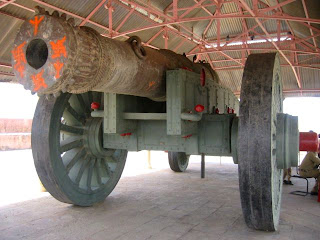
Jon was kind enough to join me for a Super Bowl Preplay last night, so that I could send results to pizzaboxfootball.com. Jon took the Colts while I had my high-school favorite Chicago Bears. Alas that I didn't have the actual Bears from my teenage years in the 80's.
In the first half, Peyton Manning (of the Colts -- see picture) moved the ball effortlessly down the field, but struggled in the red zone. In five trips deep into Chicago territory, the Colts managed only 1 TD, 2 FG, and two interceptions. But Rex Grossman redefined inept, going 3-10 for 75 yards and a pick. Only two big plays (a 57-yard 1st-down bomb from Grossman after a pick, and a 54-yard run by Cedric Benson) kept the game close, with the Colts leading 13-6 at halftime.
Grossman finally started connecting with Bernard Berrian in the second half, and two big scoring plays (35-yard run by Thomas Jones, 54-yard catch by Berrian) put the Bears up 20-19 midway through the third. But that was the closest they would come to the Vince Lombardi trophy. Manning put his team on his back, calling 14 passes and only 4 runs down the stretch, and cruising into the end zone twice for the 33-20 win. On their last two possessions, the Bears managed only 4 yards of offense, while the Colts ran down the clock by *passing*, completing nine out of ten throws with only one rushing attempt. Manning won the MVP with cartoonish passing numbers (see below).
Scoring:
Bears 3-3-7-7 --- 20
Colts 7-6-3-17 --- 33
Rushing: Bears 21-134, 1TD, 0 fumble. Colts 20-122, 1 TD, 0 fumble.
Passing: Grossman (Bears) 8-20, 202 yards, 1TD, 1 INT, 2 sacks. Manning (Colts) 34-51, 509 yards, 2 TD, 2 INT, 2 sacks.
This matchup brought out all that I like and dislike about Pizza Box Football. It resolves quickly (just over two hours, with us dilly-dallying and having fun with it), makes some reasonable statistical sense, gives interesting play-calling decisions, and managed to stay close and exciting until the fourth quarter. The Mishap and Pressure tables are particularly fun; Grossman's pick was off of a tipped pass, and Manning is tough to pressure, twice rolling out of the collapsing pocket for completions. But it does have two flaws, I think:
1. Offense rules over defense. Offense quality is taken into account by modifying the results table that you roll on for each play. Defense quality is included by allowing an extra die on the defensive chart *when the defense guesses the play correctly*. So everytime Manning throws a short or long pass, he is benefitting from his superior table. But the Bears only get their defensive strength when they guess correctly (technically a 1 in 3 shot), and then the extra die only helps some of the time (about 1 in 2), and then it still may not be enough to bump you to the next level on the chart. So quality offenses benefit 100% of the time, while quality defenses benefit ~10% of the time. Jon was right to kill the clock by throwing; even when I guessed correctly, Manning had a better than 50% shot at a completion.
2. Big plays (usually a 16-18 on three dice) are too common. A real NFL team can count on a handful of 40+ yard plays in an entire season. There were six just in this game, along with a couple more where the end zone got in the way.
How would I fix it:
1. Change the results table to 4d6. This narrows the bell curve, making extreme events less common.
2. Change the defensive results table to a straight +/- modifier, not another die roll, which speeds resolution. And make the adjustment count more. A long pass should have a completion chance in the low 30s% against a base defense (once per three downs). If the defense is completely out of place, that should boost to ~50% (QBs can still be inaccurate). If the defense is focusing deep, the chance should be closer to 10% (catches are occasionally made in triple coverage).
I still haven't worked out how best to fix defenses, but I'm working on it.
Labels: ramblings, session report
 What happens in Vegas stays in Vegas, but I may have an anecdote or two. (I could be bluffing).
What happens in Vegas stays in Vegas, but I may have an anecdote or two. (I could be bluffing).



































